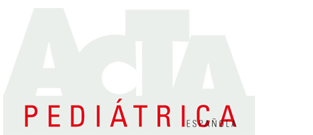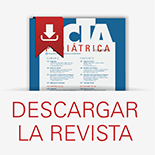Volumen 64 - Número 8 - Septiembre 2006
Publicado en
Originales
Rehidratación intravenosa rápida en urgencias: comparación con la pauta tradicional
Intravenous rapid rehydration in the emergency department, compared to the traditional guideline
R. Mosqueda Peña, P. Rojo ConejoHospital Universitario «Doce de Octubre». Madrid
Publicado en
Notas clínicas
Manejo de la pancreatitis aguda grave en niños. Serie de 3 casos
Management of severe acute pancreatitis in children. A series of 3 cases
D. Folgado Toledo, F. Delgado Ledesma, C. Pérez-Caballero Macarrón, A. Coca Pérez, J.L. Vázquez MartínezUnidad de Cuidados Intensivos Pediátricos. Hospital Universitario Ramón y Cajal. Madrid














